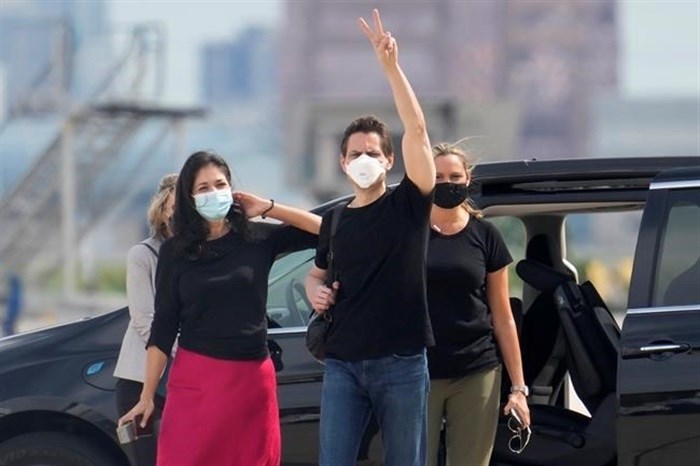
Michael Kovrig, centre right, waves to media as his wife Vina Nadjibulla, centre left, and sister Ariana Botha after his arrival at Pearson International Airport in Toronto on September 25, 2021.
Image Credit: THE CANADIAN PRESS/Frank Gunn
September 26, 2021 - 8:00 PM
OTTAWA - The return of two detained Canadians may have ended the most contentious dispute in Canada’s relationship with China, but experts say Ottawa faces a number of other extremely difficult challenges and choices in its dealings with Beijing.
Those include immediate issues such as whether to let Chinese telecom giant Huawei participate in Canada’s 5G wireless network, as well as broader questions of whether the emergent Asian superpower should be treated as a partner, competitor or adversary.
Global Affairs Minister Marc Garneau acknowledged Sunday the degree to which the detention of Michael Kovrig and Michael Spavor — in apparent retaliation for Canada’s arrest of Huawei executive Meng Wanzhou — had impeded ties between the two countries.
“There was no path to a relationship with China as long as the two Michaels were being detained,” Garneau said during an appearance on CBC’s Rosemary Barton Live, referencing the colloquial term adopted around the world when discussing the former detainees.
Kovrig and Spavor were released Friday after more than 1,000 days in Chinese detention, the same day Meng was released from Canadian custody after reaching a plea deal with authorities from the U.S., where she had faced fraud charges.
With that situation resolved, University of British Columbia professor and leading expert on China and Asia Paul Evans says the newly re-elected Liberal government has a number of immediate issues to address and decisions to make.
Those include finally delivering a verdict on whether Huawei can participate in Canada’s 5G network. Canada is the only member of the Five Eyes intelligence-sharing network, which includes the U.S., Britain, Australia and New Zealand, to have not already banned the company.
There are also ongoing questions about the degree to which Canadian universities can and should be allowed to partner with Chinese entities on research and development, and how to treat Chinese investments in strategically important sectors.
“There are some very immediate issues that have been almost deferred,” Evans said. “So we have some immediate choices.”
Yet there is also a clear need for a long-term strategy for Canada’s dealings with both China and the broader Asia-Pacific region, said University of Ottawa professor Roland Paris, who served as Prime Minister Justin Trudeau’s first foreign policy adviser.
Canada has quietly adopted a number of positions with respect to China as the two Michaels languished in Chinese prisons, particularly as Beijing has adopted increasingly aggressive foreign and economic policies.
That includes calling the Chinese communist government out over its attempts to stifle democracy in Hong Kong, treatment of ethnic Uighurs and other minorities, sabre rattling in the South China Sea, and use of economic and cyber espionage.
Yet the level of economic integration between Canada and China and the need to co-operate on issues like climate change means defining different aspects of the relationship in terms of what Paris describes as co-operation, competition and confrontation.
The complexity of those issues, along with the growing economic and geo-political importance of China and the surrounding region, led the European Union to release an Asia-Pacific strategy this month. The U.S. is expected to follow suit this fall.
This month Australia, Britain and the U.S. also announced a new defensive partnership aimed exclusively at China that includes Australia’s purchase of nuclear-powered submarines and which notably excluded Canada and New Zealand despite the Five Eyes alliance.
While it isn’t clear the extent to which Canada was aware of the arrangement before it was announced, Evans said the other three participants may have had concerns around Ottawa's inclusion.
“They would have known there was a level of ambiguity about our approaches to China," he said.
The Liberals promised during the election to launch an Asia-Pacific strategy for the region, emphasizing the importance of building new trade ties and expanding existing ones while also referencing greater diplomatic and military relationships in the area.
Paris suggested the creation of such a policy should be a priority for the newly re-elected government.
“All of our partners are trying to adjust to a changing Indo-Pacific, particularly with the rise of a more aggressive (China),” he said. “Many of those partners are starting to put together more co-ordinated national strategies. And now it's incumbent on Canada to do the same.”
This report by The Canadian Press was first published Sept. 26, 2021.
News from © The Canadian Press, 2021